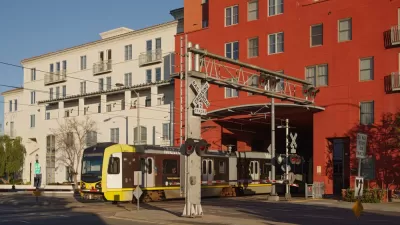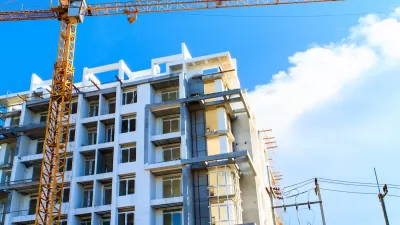The “Connected Communities” zoning plan aims to increase middle housing near transit and in Cincinnati neighborhoods’ business districts.

The Cincinnati planning commission has approved the Connected Communities zoning plan after two years of public engagement, according to a local WCPO 9 News article by Andrew Ronan. The plan overhauls existing zoning codes which has prohibited construction of anything but single-family homes in most neighborhoods since the 1960s. In order to become law, it must now go for review and a vote by the city’s Equitable Growth and Housing Committee and then a final vote by the city council.
If approved into law, the Connected Communities proposal would allow developers to build duplexes, rowhomes, and small mixed-use buildings to neighborhood business districts and along major bus routes. Advocates for the plan say it is desperately needed to expand the city’s stagnant housing supply to meet the demands of its growing population and to support economic growth. Critics of the plan say it is a one-size-fits-all approach that leaves which neighborhoods to build in up to developers, which could lead to booms in neighborhoods whose infrastructure might not be adequate to support increased density.
FULL STORY: Cincinnati Planning Commission passes 'Connected Communities' zoning overhaul

Maui's Vacation Rental Debate Turns Ugly
Verbal attacks, misinformation campaigns and fistfights plague a high-stakes debate to convert thousands of vacation rentals into long-term housing.

Planetizen Federal Action Tracker
A weekly monitor of how Trump’s orders and actions are impacting planners and planning in America.

In Urban Planning, AI Prompting Could be the New Design Thinking
Creativity has long been key to great urban design. What if we see AI as our new creative partner?

King County Supportive Housing Program Offers Hope for Unhoused Residents
The county is taking a ‘Housing First’ approach that prioritizes getting people into housing, then offering wraparound supportive services.

Researchers Use AI to Get Clearer Picture of US Housing
Analysts are using artificial intelligence to supercharge their research by allowing them to comb through data faster. Though these AI tools can be error prone, they save time and housing researchers are optimistic about the future.

Making Shared Micromobility More Inclusive
Cities and shared mobility system operators can do more to include people with disabilities in planning and operations, per a new report.
Urban Design for Planners 1: Software Tools
This six-course series explores essential urban design concepts using open source software and equips planners with the tools they need to participate fully in the urban design process.
Planning for Universal Design
Learn the tools for implementing Universal Design in planning regulations.
planning NEXT
Appalachian Highlands Housing Partners
Mpact (founded as Rail~Volution)
City of Camden Redevelopment Agency
City of Astoria
City of Portland
City of Laramie





























